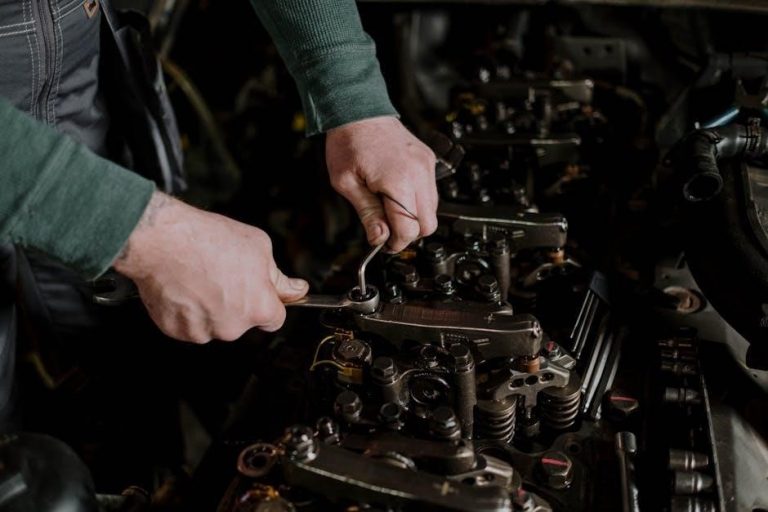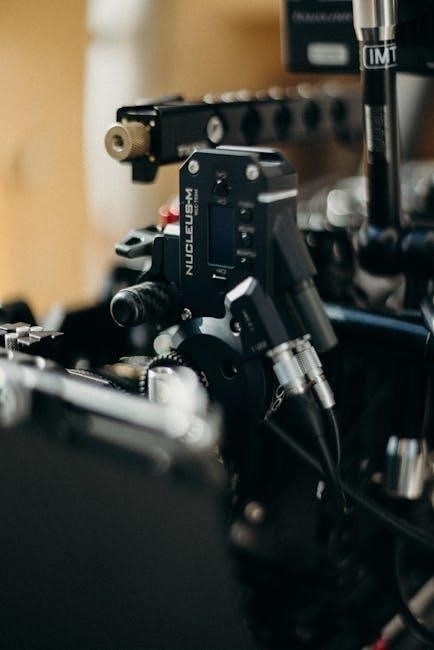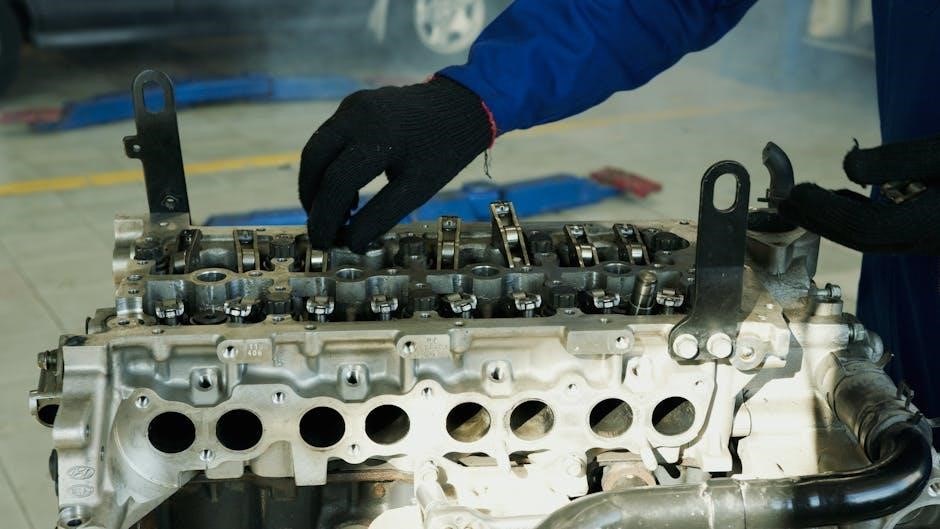
This manual provides essential guidance for the operation‚ maintenance‚ and repair of the Detroit Diesel Series 60 12.7L engine‚ ensuring optimal performance and longevity.
1.1 Overview of the Detroit Diesel Series 60 Engine
The Detroit Diesel Series 60 12.7L engine is a high-performance‚ heavy-duty power unit designed for reliability and efficiency‚ widely used in trucks and industrial applications.
1.2 Importance of the Manual for Engine Operation and Maintenance
The manual is crucial for understanding the Detroit Diesel Series 60 12.7L engine’s operation‚ maintenance‚ and troubleshooting‚ ensuring safety‚ efficiency‚ and extending the engine’s lifespan by following proper procedures and guidelines.
1.3 Safety Precautions and Guidelines
Adhering to safety guidelines is critical when working with the Detroit Diesel Series 60 12.7L engine. Always wear protective gear‚ including gloves and safety goggles. Ensure the engine is cool and properly ventilated before starting maintenance. Disconnect the battery and follow lockout/tagout procedures to prevent accidental start-ups. Never bypass safety features or ignore warnings‚ as this can lead to serious injury or damage. Properly handle hazardous materials like fuel and coolant‚ and dispose of them responsibly. Refer to the manual for specific safety instructions tailored to your engine model and operating conditions.

Key Features and Benefits of the Detroit Series 60 12;7L Engine
The Detroit Series 60 12.7L engine offers impressive fuel efficiency‚ high performance‚ and emissions compliance‚ making it a reliable choice for heavy-duty applications and long-haul operations.
2.1 Engine Specifications and Technical Details
The Detroit Series 60 12.7L engine features a 12.7-liter displacement with a 6-cylinder inline configuration‚ delivering high horsepower and torque for optimal performance. Designed for heavy-duty applications‚ it incorporates advanced fuel injection systems and emissions control technologies to meet stringent environmental standards. The engine’s robust design ensures reliability and durability‚ while its fuel efficiency enhances operational cost-effectiveness. Technical details include precise piston design‚ cylinder arrangement‚ and a reliable cooling system‚ making it a versatile choice for various industrial and automotive needs.
2.2 Fuel Efficiency and Performance Capabilities
The Detroit Series 60 12.7L engine excels in fuel efficiency‚ optimizing performance without compromising power. Its advanced combustion technology ensures minimal fuel consumption while maintaining high torque and horsepower outputs. Designed for heavy-duty applications‚ the engine delivers consistent performance across various operating conditions. Enhanced fuel management systems contribute to reduced emissions and lower operational costs‚ making it a cost-effective and environmentally friendly choice for industrial and automotive use. This balance of efficiency and power ensures superior performance in demanding environments.
2.3 Emissions Compliance and Environmental Benefits
The Detroit Series 60 12.7L engine is designed to meet stringent emissions standards‚ incorporating advanced technologies like the Diesel Particulate Filter (DPF) and Exhaust Gas Recirculation (EGR) systems. These systems significantly reduce particulate matter and nitrogen oxide emissions‚ ensuring compliance with environmental regulations. The engine’s emissions control systems contribute to cleaner air quality and reduced carbon footprint‚ making it an eco-friendly choice for heavy-duty applications. By minimizing harmful emissions‚ the Series 60 engine supports sustainable transportation solutions while maintaining high performance levels.

Technical Specifications of the Detroit Series 60 12.7L Engine
The Detroit Series 60 12.7L engine features a displacement of 12.7 liters‚ 6 cylinders‚ and is turbocharged with an aftercooler‚ delivering up to 450 horsepower and 1‚650 lb-ft torque.
3.1 Displacement and Cylinders
The Detroit Series 60 12.7L engine features a displacement of 12.7 liters‚ with a 6-cylinder inline configuration. This design ensures a balance between power output and fuel efficiency. The engine’s displacement is calculated based on the combined volume of its cylinders‚ which directly impacts its ability to produce torque and horsepower. The 6-cylinder layout is optimized for smooth operation and reduced vibration‚ making it ideal for heavy-duty applications. This configuration also supports the engine’s turbocharged and aftercooled system‚ enhancing performance and efficiency under various operating conditions.
3.2 Horsepower and Torque Ratings
The Detroit Series 60 12.7L engine delivers impressive horsepower and torque‚ ranging from 350 to 500 horsepower and up to 1‚850 lb-ft of torque‚ depending on the configuration. These ratings ensure robust performance for heavy-duty applications. The engine’s power output is optimized for both on-highway and off-highway use‚ providing the necessary strength for hauling and industrial operations. Proper maintenance and adherence to manufacturer guidelines are crucial to sustaining these performance levels and ensuring long-term reliability.
3.3 Emissions Standards and Certifications
The Detroit Series 60 12.7L engine complies with stringent emissions standards‚ including EPA regulations‚ through advanced technologies like EGR and DPF systems. These systems reduce nitrogen oxides and particulate matter‚ ensuring environmental compliance. The engine is certified to meet or exceed emissions requirements for on-highway and off-highway applications‚ making it a reliable choice for operators seeking to minimize environmental impact while maintaining performance efficiency.

Maintenance Schedule and Procedures
Regular maintenance ensures optimal performance and longevity. Daily checks‚ weekly inspections‚ and monthly services are essential‚ along with annual overhauls and troubleshooting common issues promptly.
4.1 Daily Maintenance Checks
Daily inspections are crucial for ensuring the Detroit Diesel Series 60 12;7L engine operates efficiently. Check oil and coolant levels‚ inspect belts for wear‚ and ensure proper air filter condition. Verify the fuel level and look for leaks in the fuel system. Examine the exhaust system for blockages or damage. Monitor the battery charge and connections. Test all warning lights and alarms to ensure they function correctly. Record findings and address any issues promptly to prevent potential breakdowns and maintain engine performance.
4.2 Weekly and Monthly Maintenance Tasks
Weekly and monthly maintenance ensures the Detroit Diesel Series 60 12.7L engine remains in optimal condition. Every 7-10 days‚ change the air and fuel filters‚ and inspect the diesel particulate filter (DPF) for soot buildup. Check the coolant level and top it off if necessary. Lubricate moving parts and inspect hoses for cracks or leaks. Monthly‚ perform a detailed inspection of the exhaust gas recirculation (EGR) system and clean or replace components as needed. Schedule a thorough inspection of the engine’s belts and tensioners to ensure proper operation.
4.3 Annual Maintenance and Inspection Requirements
Annual maintenance is crucial for the Detroit Diesel Series 60 12.7L engine to ensure long-term reliability. Perform a comprehensive inspection of the engine‚ including the cooling system‚ belts‚ and hoses. Replace the engine oil and filter‚ and inspect the fuel injection system for wear. Clean or replace the diesel particulate filter (DPF) as needed‚ and service the exhaust gas recirculation (EGR) system. Check the crankshaft and camshaft for alignment and wear‚ and inspect the cylinder head for leaks or damage. Schedule a professional overhaul of the engine if any major issues are detected.
4.4 Troubleshooting Common Issues
Common issues with the Detroit Diesel Series 60 12.7L engine include DPF clogging‚ error codes‚ and low fuel pressure. Start by checking the DPF for soot buildup and perform regeneration if necessary. Use diagnostic tools to identify error codes and address underlying problems‚ such as faulty sensors or fuel system leaks. Inspect the fuel injectors for wear and clean or replace them as needed. Address cylinder misfires by checking compression and injector performance. Always consult the manual for specific troubleshooting steps and seek professional assistance if issues persist to avoid further damage.

Engine Design and Architecture
The Detroit Diesel Series 60 12.7L engine features a robust design with a cast-iron cylinder block‚ crankcase‚ and a modular architecture for enhanced durability and serviceability.
5.1 Overview of the Engine’s Structural Components
The Detroit Diesel Series 60 12.7L engine comprises key structural components‚ including a robust cast-iron cylinder block‚ crankcase‚ and a modular engine design. The cylinder block is designed to withstand high compression forces‚ while the crankcase ensures durability and houses critical internal components. Additionally‚ the engine features a cylinder head that integrates advanced valvetrain mechanisms‚ contributing to efficient combustion. These components work together to enhance engine performance‚ reliability‚ and longevity‚ making it a reliable choice for heavy-duty applications. Regular maintenance of these parts is crucial for sustained optimal operation.
5.2 Cylinder Block and Crankcase Design
The Detroit Diesel Series 60 12.7L engine features a robust cast-iron cylinder block‚ designed for strength and durability. The crankcase is integrated into the block‚ housing the crankshaft and bearings‚ which minimizes vibration and enhances stability. The block includes precision-aligned cylinder bores‚ ensuring proper piston fitment and efficient combustion. The crankcase is constructed to withstand high-pressure forces‚ while its design allows for easy access during maintenance. This robust architecture ensures reliable performance and extends the engine’s service life‚ making it suitable for demanding applications. Proper cooling system integration further enhances its operational efficiency.
5.3 Cylinder Head and Valvetrain Components
The Series 60 12.7L engine’s cylinder head is crafted from high-strength aluminum‚ offering excellent thermal conductivity and durability. It incorporates a overhead valve design‚ with four valves per cylinder for optimal airflow and combustion efficiency. The valvetrain components‚ including camshaft‚ lifters‚ and pushrods‚ are precision-engineered to ensure precise timing and minimal wear. The head features integrated cooling galleries to maintain optimal temperature‚ while hydraulic lash adjusters simplify maintenance. This design enhances fuel efficiency‚ reduces emissions‚ and provides reliable performance under various operating conditions‚ making it a cornerstone of the engine’s reliability and power delivery.
5.4 Piston and Connecting Rod Assembly
The Series 60 12.7L engine features forged steel pistons designed for durability and thermal efficiency. The pistons are equipped with cooling galleries to manage heat distribution effectively. The connecting rods are crafted from high-strength steel alloy‚ ensuring longevity under heavy loads. A durable piston skirt coating enhances resistance to wear‚ while the wrist pins and bushings provide smooth operation. This assembly is engineered to withstand high compression forces‚ optimizing power delivery and fuel efficiency. Regular inspection and maintenance of these components are critical to maintaining engine performance and preventing premature wear.
5.5 Crankshaft and Camshaft Design
The Detroit Diesel Series 60 12.7L engine features a robust crankshaft designed for high torque applications‚ with counterweights to ensure smooth operation and minimize vibrations. The camshaft is precision-engineered to optimize valve timing‚ enhancing fuel efficiency and power delivery. Both components are constructed from high-strength materials for durability and reliability. The crankshaft’s forged steel construction ensures longevity under heavy-duty conditions‚ while the camshaft’s precise machining promotes consistent performance. Together‚ these critical components contribute to the engine’s overall efficiency and operational excellence;
5.6 Lubrication System Components
The Detroit Diesel Series 60 12.7L engine features a robust lubrication system designed to ensure consistent oil flow to all critical components. The system includes an oil pump‚ oil filter‚ and oil cooler‚ working together to maintain optimal engine temperature and lubrication. The oil pump delivers pressurized oil throughout the engine‚ while the oil filter ensures cleanliness for extended component life. The oil cooler regulates temperature‚ preventing overheating and maintaining viscosity. Regular maintenance of these components is vital for engine longevity and performance. Proper lubrication is essential for minimizing wear and ensuring reliable operation.
5.7 Cooling System Overview
The Detroit Diesel Series 60 12.7L engine is equipped with a sophisticated cooling system designed to maintain optimal operating temperatures. The system includes a high-capacity radiator‚ water pump‚ and coolant hoses‚ working together to circulate coolant through the engine block and cylinder head. The thermostat regulates coolant flow‚ ensuring efficient warm-up and consistent temperature control. Proper cooling system maintenance‚ including regular coolant checks and hose inspections‚ is crucial for preventing overheating and ensuring reliable engine performance. This system is vital for protecting engine components from thermal stress and extending service life.

Fuel System and Combustion Process
The Detroit Diesel Series 60 12.7L engine features a precise fuel injection system and efficient combustion process‚ optimized for performance‚ fuel efficiency‚ and emissions control.
6.1 Fuel Injection System Components
The Detroit Diesel Series 60 12.7L engine’s fuel injection system includes precision-engineered components such as fuel injectors‚ high-pressure fuel pumps‚ fuel rails‚ and electronic control units. These components work together to deliver the exact amount of fuel required for optimal combustion efficiency. The system is designed to ensure precise fuel metering and atomization‚ which are critical for achieving high performance‚ reduced emissions‚ and improved fuel economy. Regular maintenance and inspection of these components are essential to maintain engine reliability and efficiency.
6.2 Fuel Injection Process and Timing
The Detroit Diesel Series 60 12.7L engine features a high-pressure fuel injection system designed for precise fuel delivery. The electronic control module calculates the optimal injection timing based on engine speed‚ load‚ and operating conditions. Fuel is injected into the combustion chamber at the correct pressure and timing to ensure efficient combustion. This process minimizes emissions and maximizes fuel efficiency. The system’s advanced timing ensures proper fuel atomization‚ which is critical for performance and engine longevity. Regular maintenance of the fuel injection components is essential to maintain optimal timing and engine operation.
6.3 Combustion Chamber Design and Efficiency
The Detroit Diesel Series 60 12.7L engine features a combustion chamber designed to optimize fuel efficiency and reduce emissions. The chamber’s shape and dimensions are engineered to ensure a homogeneous air-fuel mixture‚ promoting complete combustion. A centralized fuel injector and carefully designed piston crown contribute to efficient fuel utilization. This design enhances thermal efficiency‚ reducing fuel consumption and emissions. The combustion chamber’s efficiency is further supported by the engine’s advanced emission control systems‚ ensuring compliance with environmental standards while maintaining robust performance. Regular maintenance of the chamber and related components is crucial for sustained efficiency.

Emissions Control Systems
The Detroit Diesel Series 60 12.7L engine incorporates advanced emissions control systems‚ including the Diesel Particulate Filter (DPF) and Exhaust Gas Recirculation (EGR)‚ to minimize environmental impact and meet regulations.
7.1 Diesel Particulate Filter (DPF) System
The Detroit Diesel Series 60 12.7L engine features a Diesel Particulate Filter (DPF) system designed to capture and reduce particulate matter emissions. This system operates by trapping soot and other particles in the exhaust stream‚ ensuring compliance with emissions standards. Regular maintenance‚ including DPF regeneration‚ is crucial to maintain engine performance and efficiency. The DPF system works in conjunction with the engine’s electronic controls to monitor and manage filter condition‚ ensuring optimal emissions reduction while minimizing the need for manual interventions.
7.2 Exhaust Gas Recirculation (EGR) System
The Detroit Diesel Series 60 12.7L engine incorporates an Exhaust Gas Recirculation (EGR) system to reduce nitrogen oxide (NOx) emissions. The EGR system redirects a portion of the exhaust gases back into the engine’s combustion chamber‚ lowering combustion temperatures and reducing NOx formation. The system includes an EGR cooler‚ valve‚ and sensor‚ working in conjunction with the engine’s electronic control module to ensure precise operation. Regular maintenance of the EGR system is essential to prevent clogging and ensure optimal emissions performance‚ as outlined in the manual.
7.3 Emissions Compliance and Maintenance
The Detroit Diesel Series 60 12.7L engine is designed to meet stringent EPA emissions standards through advanced emissions control systems. Regular maintenance is crucial to ensure compliance and performance. The manual outlines procedures for inspecting and cleaning the Diesel Particulate Filter (DPF) and verifying Exhaust Gas Recirculation (EGR) system functionality. Additionally‚ routine software updates and component replacements‚ such as EGR coolers and sensors‚ are recommended to maintain emissions integrity. Adhering to the specified maintenance schedule ensures the engine operates within regulatory limits while optimizing fuel efficiency and reducing environmental impact.

Diagnostic and Troubleshooting Procedures
The Detroit Diesel Series 60 12.7L engine features advanced diagnostic systems for identifying and addressing operational issues efficiently. The DDEC system provides detailed fault codes‚ enabling precise troubleshooting of engine malfunctions.
Regular checks of sensors‚ fuel systems‚ and emissions components are critical to maintaining optimal performance and resolving potential issues before they escalate. Timely diagnostics ensure engine longevity.
8.1 Detroit Diesel Electronic Control (DDEC) System
The Detroit Diesel Electronic Control (DDEC) system is a sophisticated electronic engine control system designed to monitor and manage engine performance in real-time. It provides detailed diagnostics‚ enabling technicians to identify and address issues efficiently. The DDEC system plays a crucial role in optimizing fuel efficiency‚ reducing emissions‚ and ensuring reliable engine operation.
By continuously monitoring key engine parameters‚ such as fuel injection timing‚ exhaust gas recirculation‚ and combustion efficiency‚ the DDEC system helps maintain peak performance. It also generates diagnostic trouble codes (DTCs) to pinpoint specific malfunctions‚ simplifying troubleshooting and repair processes.
8.2 Diagnostic Trouble Codes (DTCs) and Interpretations
Diagnostic Trouble Codes (DTCs) are standardized codes used by the DDEC system to identify specific malfunctions in the Detroit Diesel Series 60 12.7L engine. These codes are generated when the system detects deviations from normal operation‚ such as sensor failures‚ fuel system issues‚ or emissions-related problems. Each DTC corresponds to a specific issue‚ providing technicians with a clear starting point for diagnosis. Common DTCs include those related to fuel injection timing‚ exhaust gas recirculation‚ and combustion efficiency. By interpreting these codes using the manual or specialized tools‚ technicians can quickly identify and address problems‚ ensuring efficient and accurate repairs.
8.3 DPF Regeneration Process and Issues
The Diesel Particulate Filter (DPF) regeneration process in the Detroit Diesel Series 60 12.7L engine is a critical emissions control function. During regeneration‚ the system burns off accumulated soot in the DPF at high temperatures‚ ensuring optimal emissions performance. Issues such as incomplete regeneration‚ clogged filters‚ or malfunctioning sensors can disrupt this process‚ leading to reduced engine efficiency and potential damage. The manual provides detailed troubleshooting steps and maintenance recommendations to address these issues‚ ensuring the DPF operates effectively and complies with environmental standards. Regular monitoring and timely intervention are essential to prevent complications.
8.4 Common Faults and Repair Solutions
The Detroit Diesel Series 60 12.7L engine may experience faults such as low fuel pressure‚ sensor malfunctions‚ or coolant leaks. These issues often arise from worn components or improper maintenance. Repair solutions include replacing faulty sensors‚ inspecting fuel lines for blockages‚ and addressing leaks promptly. Regular inspection of critical systems‚ such as the DPF and EGR‚ can prevent major repairs. Following the manual’s diagnostic procedures ensures accurate troubleshooting and effective resolution of common faults‚ minimizing downtime and maintaining engine performance.

Engine Repair and Overhaul
Specialized tools and detailed guides are required for engine repair. This section covers critical components‚ torque specifications‚ and post-repair testing procedures for optimal performance.
9.1 Tools and Equipment Required for Engine Repair
Repairing the Detroit Diesel Series 60 12.7L engine requires specialized tools‚ such as piston ring compressors‚ dial indicators‚ and torque wrenches. Essential equipment includes wrenches‚ screwdrivers‚ and precision measuring tools. Safety gear like heat-resistant gloves and safety glasses is crucial. Diagnostic tools‚ such as compression testers and multimeters‚ aid in identifying issues. Proper tools ensure accurate disassembly‚ inspection‚ and reassembly‚ preventing damage and ensuring reliability. Always refer to the manual for specific tool recommendations and torque specifications to maintain engine integrity and performance.
9.2 Step-by-Step Engine Disassembly Process
Begin by draining fluids and removing external components like belts and accessories. Disconnect fuel and coolant lines‚ then remove the intake manifold and exhaust system. Next‚ take out the cylinder head‚ fuel injectors‚ and turbocharger. Carefully extract the pistons and connecting rods‚ followed by the crankshaft and camshaft. Document each step and label parts for reassembly. Use specialized tools to avoid damage. Always follow torque specifications and safety guidelines to ensure a successful disassembly process.
9.3 Inspection and Measurement of Engine Components
Inspect all components for wear‚ damage‚ or excessive clearance. Use micrometers to measure cylinder walls‚ pistons‚ and bearings. Check crankshaft and camshaft for scoring or uneven wear. Verify valve train components for proper clearance and condition. Compare all measurements to factory specifications. Document any deviations or damage for repair or replacement. Ensure all parts are clean and free of debris before measurement. This step is critical for determining the extent of repairs needed and ensuring precise reassembly.
9.4 Reassembly and Testing Procedures
Reassemble the engine by reversing the disassembly process‚ ensuring all components are properly aligned and torqued to specifications. Apply lubricants to moving parts and verify system connections. Conduct a series of tests‚ including compression checks and fluid pressure tests‚ to ensure functionality. Start the engine and monitor for leaks‚ unusual noises‚ or performance issues. Perform a full diagnostic test using the DDEC system to confirm proper operation. Document test results for future reference and ensure all systems operate within factory specifications.
9.5 Replacing Worn or Damaged Parts
Inspect and identify worn or damaged components‚ such as pistons‚ rings‚ or cylinder heads‚ and replace them with genuine Detroit Diesel parts. Use specialized tools to ensure proper fitment and alignment. Follow torque specifications for bolts and fasteners to prevent damage. Clean all surfaces thoroughly before installation. Reassemble components in the correct order‚ ensuring proper sealing and alignment. After replacement‚ perform a thorough test of the engine to verify performance and eliminate any leaks or irregularities. Maintain detailed records of replaced parts for future maintenance tracking.

Resources and References
Refer to official Detroit Diesel manuals‚ online forums‚ and authorized service centers for detailed guidance‚ parts‚ and expert support for the Series 60 12.7L engine.
10.1 Official Detroit Diesel Service Manuals
Official Detroit Diesel service manuals provide comprehensive instructions for diagnosing‚ maintaining‚ and repairing the Series 60 12.7L engine. These manuals cover technical specifications‚ troubleshooting‚ and repair procedures‚ ensuring accurate and efficient service. They are available in PDF format for easy access and include detailed diagrams and step-by-step guides. Users can download these manuals from authorized sources or access them through Detroit Diesel’s official website. Regular updates ensure compliance with the latest emissions and performance standards‚ making them indispensable for professionals and enthusiasts alike. These resources are essential for maintaining peak engine performance‚ safety‚ and reliability.
10.2 Online Forums and Communities for Support
Online forums and communities offer valuable support for Detroit Diesel Series 60 12.7L engine owners and technicians. Platforms like ManualLib.com and Usermanual.com provide access to user manuals‚ troubleshooting guides‚ and repair tips. Additionally‚ specialized forums dedicated to heavy-duty engines allow users to share experiences‚ ask questions‚ and receive advice from experts. These communities often include discussions on maintenance‚ repair‚ and optimization‚ making them a vital resource for resolving issues and improving engine performance. Active participation in these forums fosters collaboration and ensures access to the latest knowledge and solutions.
10.3 Authorized Service Centers and Dealerships
Authorized service centers and dealerships are critical for ensuring genuine parts and expert service for the Detroit Diesel Series 60 12.7L engine. These centers‚ certified by Daimler Trucks North America‚ provide factory-trained technicians‚ genuine OEM parts‚ and warranty support. Visit the official Detroit Diesel website or contact Daimler Trucks North America to locate the nearest authorized service center. These facilities guarantee compliance with manufacturer standards‚ ensuring reliability and performance. Regular visits to authorized centers help maintain engine longevity and prevent costly repairs.
